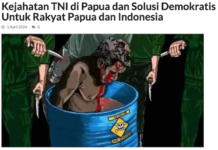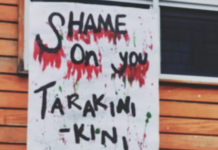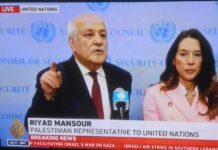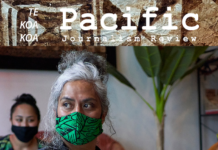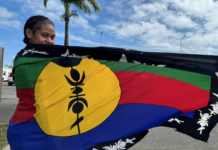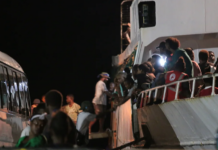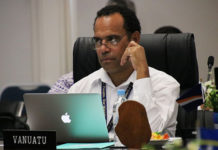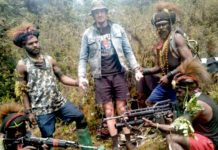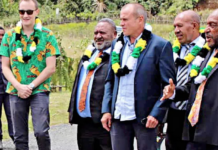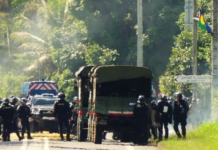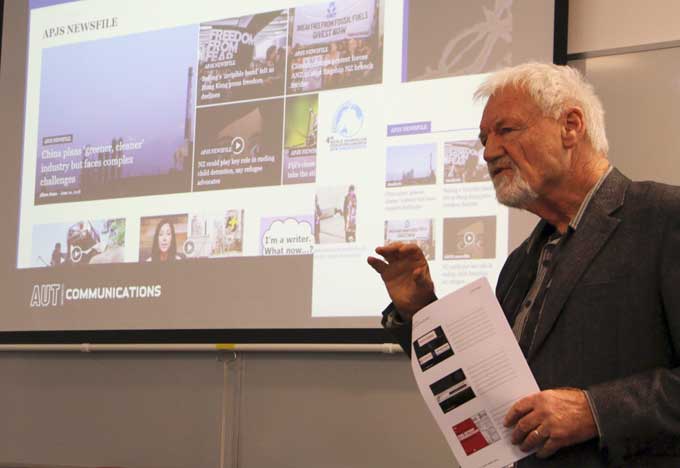
By Kendall Hutt
Journalism educators from across the Pacific have raised concerns about the current state of journalism globally at the 4th World Journalism Education Congress (WJEC) at the Auckland University of Technology this week.
The panel of educators from across New Zealand and Australia agreed better practice in journalism is required in order to truly represent diverse communities and those seen as “minorities” and disadvantaged.
Bernard Whelan, manager of Whitireia’s journalism programme, Tara Ross of the University of Canterbury, Professor David Robie of the Pacific Media Centre, and Kathryn Shine of Western Australia’s Curtin University, all said better practice could be achieved through instilling improved methods with young and aspiring journalists. 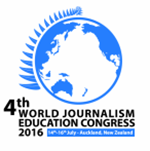
This echoed points raised by both Dr Lee Duffield and journalism educator Dr Philip Cass on Wednesday at the JEERA preconference that students were at the heart of developments in the industry.
‘Bicultural responsibility’
Whelan noted how the mainstay of American news values left no apparent room in the mainstream media to explore more “indigenous” and alternative models of reporting.
He stressed journalists, particularly in New Zealand regarding Māori, had a “bicultural responsibility” to at least consider these forms and hoped that through his PhD research a bicultural model for journalism education could be “deeply ingrained” into Whitireia’s programme.
Ross noted how students needed to report with and not on the community, which was not currently the norm as it was different from “normative” educational process.
She stressed the importance of students understanding the consequences of their stories and noted how they need a measure of accountability.
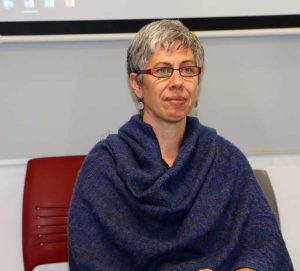
This evoked a vocal response from one of the delegates present, who stressed that a journalist’s stories are not momentary for those that are featured, as the story has a “lasting, lifelong digital attachment”.
Negative focus detrimental
Shine however, raised the important issue of the prevalence of negativity in the media and the media’s seeming inability to pull away from the “if it bleeds, it leads” mentality that continues to drive the mainstream news cycle.
She said such a negative focus might mean the media was “out of sync” with the very community it sought to inform. This echoed sentiments delivered earlier by Ross, who noted that what the media perceived as the community needing was not necessarily what it wanted.
Shine also highlighted the importance of pulling away from such negative stories and perceptions with her research into teachers’ perceptions of the news and journalists.
She found more than 80 percent of teachers believed coverage of their work was negative, while 60 percent said “sweeping generalisations” resulted in media coverage being biased.
More than half concluded that the media did not convey the realities of both schools and teaching, she said.
Such revelations were concerning, as it led the community to question the credibility of the media.
In the Q and A session following the panel, one delegate raised the concern that such issues in the coverage of education posed serious dilemmas for the potential influx of young journalists, as “teachers have a fundamental influence in students career choices”.
Independent media important
Pacific Media Centre director Professor David Robie drew on the examples of Pacific Scoop and Asia Pacific Report in a case study to stress the importance of the presence of independent, alternative media in journalism schools for students to explore their potential.
Dr Robie highlighted how such media demonstrated best practice as a “cornerstone of democracy”.
He said it was integral to involve students in such a process, and noted the “innovative” work that had been achieved by postgraduate students on the PMC’s Asia-Pacific Journalism Studies course over the past few years, including missions to the Pacific.
Students from the course had covered the the 2014 general election in Fiji — the first since the 2006 militrary coup — and had assignments involving climate change in Fiji, and the Pacific Islands Forum in the Cook Islands and Vanuatu.
Both the panelists and delegates noted that if changes were not made to dominant paradigms and mainstays of journalism soon that the “rubber would hit the road” leading to an internal moral crises within the industry.


